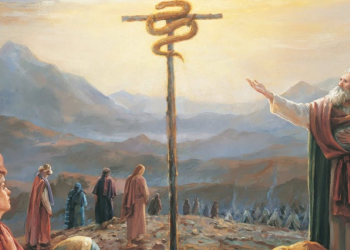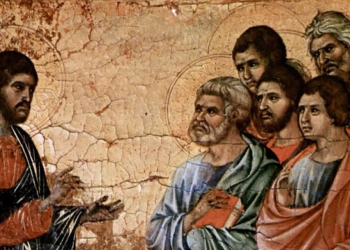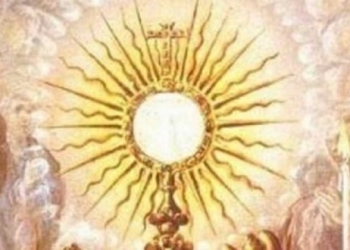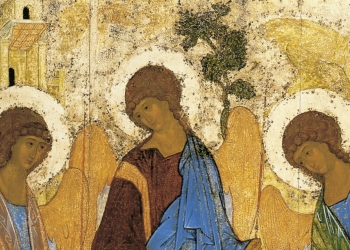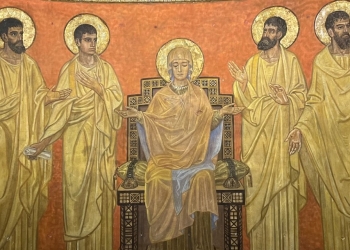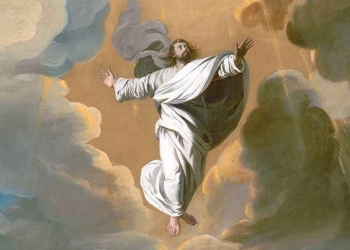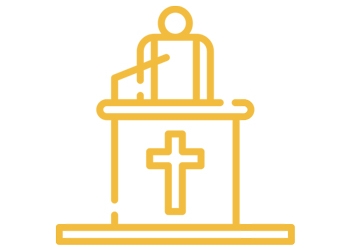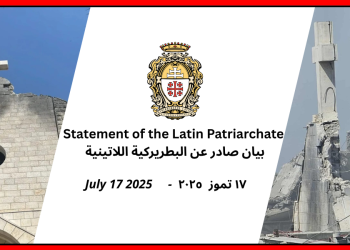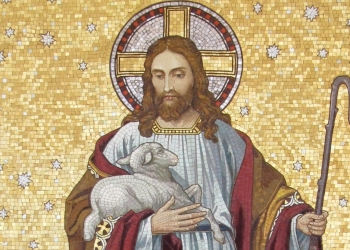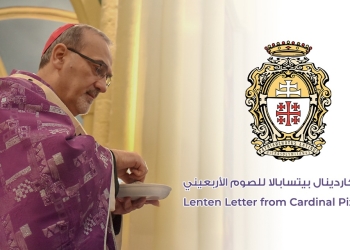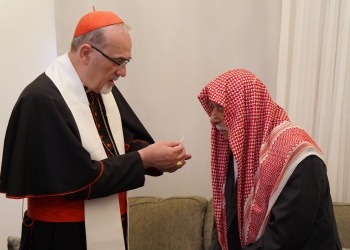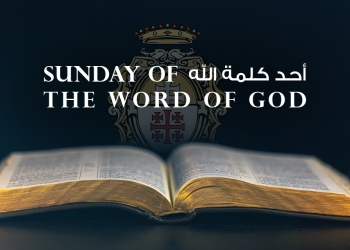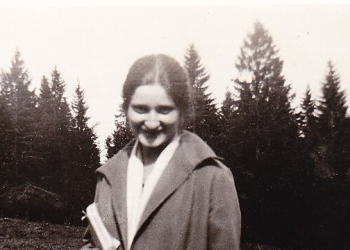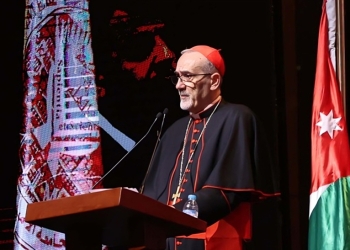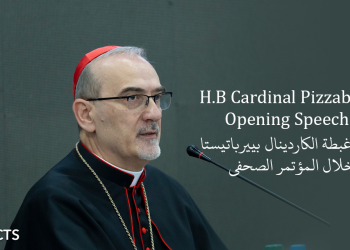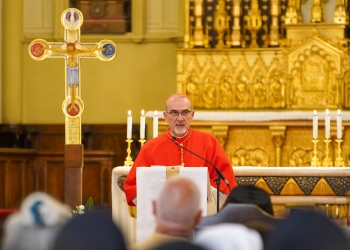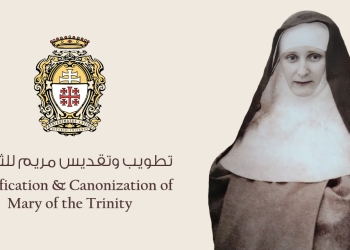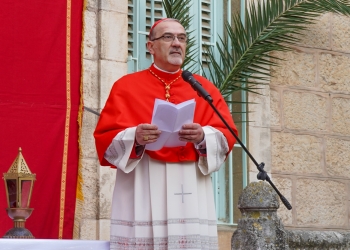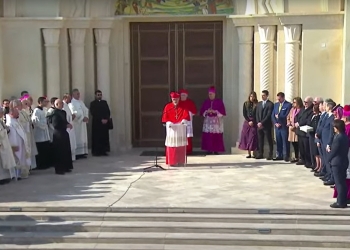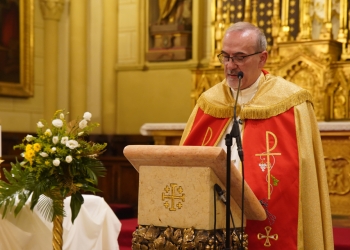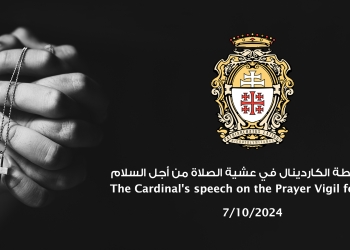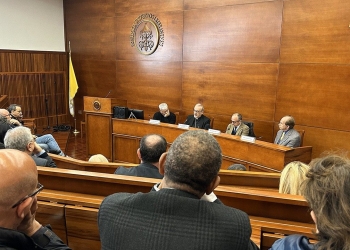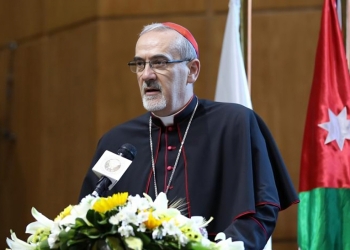Rome Meeting, Seraphicum Prolusione - Jerusalem 7th, 2022
Madrid conference on Interreligious Dialogue and Ecumenism - February 22nd, 2021
Fratelli Tutti: Reception in the Middle Eastern Islamic world and interreligious dialogue
0. Foreword
Before I begin, let me start by stating that I do not intend to talk here about interreligious dialogue on a general level, as I do not think it is within my competence. I do not intend either to talk about the reception of the encyclical "Fratelli Tutti" in the Islamic world, because that would be too vast a topic. Like Christianity, Islam is an endless galaxy, consisting not only of two main branches - Sunni and Shia - but also of many other very different derivations, cultural environments and traditions. Asian Islam is completely different from African Islam, for example. European Islam is a novelty of these last generations that has yet to find its own soul, if there ever will be one, and will probably take on different traits and characteristics depending on the country. It would not make sense, therefore, to talk about a generic Islam, theoretically involving Islam in general; because that would just be an academic theory, disconnected from the real world. I will therefore limit myself to presenting my own view, starting from my experience in the Holy Land.
The historical, religious and social cradle of Islam is in the Middle East, and the Arab world is its main cultural reference. This is where Islam was born and this is where it defined its founding traits, which have since become the norm for all. And it is now very difficult to separate Arab and Islamic cultures, which are often mistakenly understood as synonyms. When I meet churches in Europe, for example, I often hear confusion between the term "Arab" and "Muslim." This is something that really hurts Middle Eastern Christians, who are also Arabs but not Muslims.
If the Middle Eastern Arab world is the cultural and religious cradle of Islam, it also means that, in one way or another, the orientations and perspectives formed in the Middle East will influence the rest of the Islamic world. A few years ago, for example, we saw, with the emergence of Isis, how the appeal to Muslims around the world was not so irrelevant; how strong the ties of Islamic communities around the world were to this land, from the point of view of the rulings of Islamic courts and for everything that concerns their religious life. I do not intend to go inside these assessments, which are very complex, but I want to point out that, in any case, what is happening in the Middle East from the religious (but not only) point of view, in the long run, will also influence the rest of the Islamic world and therefore also the Islam that is emerging in your countries.
I will speak, therefore, from my decades of experience in the Middle East This is, however, a necessarily incomplete view, so please take my remarks with a calm critical spirit.
I will try to answer two questions:
1) How has the Encyclical "Fratelli Tutti" been received in the Middle East?
2) In light of "Fratelli Tutti", what is the situation of interreligious dialogue in the Middle East today?
1. How has the Encyclical "Fratelli Tutti" been received in the Middle East
1.1. Direct knowledge of the text of the Encyclical
The first question is very easy to answer: in the Islamic world, "Fratelli Tutti" was not received at all. It is not known. It has not been and will not be read in schools, it will not be used in mosques and Islamic study centers. There is no interest in reading and knowing the documents that come from Christian Churches, including the Holy See. Of course there are, here and there, scholars and clergy "specialized" in interreligious dialogue who have read and perhaps even commented on the papal encyclical. I am thinking right now of Prince Hassan of Jordan, uncle of King Abdallah, an expert in dialogue and a scholar of Islam. There are certainly also researchers in the various Islamic centers who had this text on their study table. But nothing more. They are mostly "secular" scholars or, at any rate, not belonging to the official Islamic religious system or religious institutions. In other words, they are people or institutions who constitute an interesting cultural presence in the area, open to dialogue and critical discussion, but who have little or no influence on the real life of the population. It should certainly not be denied that there are also among official religious institutions courageous signs of openness, such as the Sunni al-Azhar University in Cairo, which is leading the way towards dialogue and gaining increasing influence.
In the Middle East, the formation of religious thought, information and communications - everything that reaches the Arab Islamic population on religious issues, in short - is mediated by official religious institutions: mosques, imams, Islamic courts, etc. It is through them that information reaches the population, and through them that religious thinking and social attitudes in general are formed. If imams and religious leaders talk about the document, then people will know about it, through what they have heard from them.
Of course here, as in the rest of the world, the media plays a key role. Islamic religious authorities are very active in the media world, much more so than the Christian churches. Social media are flooded with religious material, and all religious leaders have their catchment area. There is no single religious authority in Islam. The various leaders have their own following, who generally follows the decisions of their leader. It should also be added that almost all of these countries have fairly strict regimes, and that civil authorities do not easily allow the publication of material that is not compatible with Islam in the media, which is often under strict control.
National institutions also play a very significant role. The decisions of governments (often absolute monarchies or dictatorships) have a decisive influence in the transmission of information and especially in education. Everywhere, school and academic curricula are highly centralized, and there is scrupulous control especially in academic circles of study texts and textbooks. Not even Christian schools are spared from this phenomenon.
It should also be mentioned that, quite often, national institutions, and especially ministries of education, are strongly Islamized. There is thus often a similar way of thinking between religious and civil institutions. Almost all Middle Eastern countries, in fact, are countries in which Islam is the state religion. The exceptions are Israel, which is a Jewish state, and perhaps Lebanon, which has a different history, but which is also paying the price right now for its intra-Islamic struggles and at the same time Christian weaknesses, visible through its intra-Christian struggles.
In short, Arab society is strongly influenced by Islamic religious thought, which deeply permeates all spheres of social life, both civil and religious. Faith is not only a personal religious experience but also defines social identity. Religion is determinative in a historical, cultural and human sense. It is rare to find traces of secular elements in it, in the sense introduced in the West by Modernity, where state and church are kept distinct and where faith is only one of the aspects, more or less relevant, of the social reality. In the Middle East, Islam enters all spheres of daily life, public and private.
Islamic religious institutions, moreover, although there are exceptions, are not concerned with interreligious dialogue and confrontation with other religious faiths. They mainly deal with domestic issues, with problems related to the civil and religious life of their countries, with issues involving their respective populations. If they turn their attention to the West or outside the Middle East, it is almost always for reasons related to the custodianship of Islamic religious values: the issue of the use of the banned hijab in France, for example, or the value of Islamic court rulings in Britain. Since, as we said previously, Islam permeates all spheres of the communities' personal and social life, it is a real problem for local Islamic authorities in Europe that non-Islamic civil courts are able to determine the lives of Muslims in the family sphere, as in divorce judgments or otherwise. Finding, moreover, representatives of Islamic religious institutions who speak any language other than Arabic is not so easy.
Finally, the difficult and troubled history between East and West still has a strong influence in the common thinking of the Muslim population. The memory of the Crusaders, of past wars, and especially of colonialism and European and Western interference in the recent past and present does not encourage an open and suspicion-free attitude toward the Churches. In Tunisia, for example, people still remember the long processions of Muslim children in the days of colonial rule; pupils of Christian religious schools, dressed as crusaders with a large cross on their chests, on the occasion of some festivity or official visit. The identification of the West with Christianity, in short, is still quite generalized and has left a still vivid memory.
These are some of the aspects that help us understand why there has not been a large circulation of Pope Francis' encyclical, even though he wrote it with Muslims in mind as well. This is not necessarily an attitude of rejection or controversy. It is simply that the thinking is centered on completely different dynamics than the European West and the Christian Churches. Because Islam totally permeates the personal and social life of the community, and because the boundaries of community identities are so strong, there is necessarily less attention to what is happening outside one's life context.
But I do not want to give the impression of being a pessimist. Indeed, what has been said so far does not mean that the content of the papal document and that the figure of the pope are viewed with dislike. On the contrary, if we exclude the most extremist and radical groups, in general there is a positive attitude towards the figure of the Pope and the gestures he makes.
Here it is: more than letters and speeches, gestures have much influence on the Arab population, because they reach the whole population without any mediation and do not need interpretations. Pope Francis' meeting in Abou Dhabi, for example, had a huge impact in the Levantine Arab public consciousness. Probably no one remembers what the two protagonists of the meeting said to each other, nor will they read the text they signed, but certainly everyone remembers the meeting and the common desire to work together.
Those gestures really help to create a positive environment, although we should not be under any illusion that everything will change at the pace that perhaps we expect. In a land where traditions and memory are a constitutive part of various community identities, changes are always long processes.
1.2 The content of the Encyclical in the lived experience of Islamic society of the Middle East
It is clear, then, that the Encyclical will not be read by the majority of the population. We have explained why. The question now remains whether at least the issues the encyclical has addressed are lived out within our societies.
The content of the document, while open to all, is still essentially Christian, and written in a Christian context. But the themes are nonetheless general, they touch everyone's life, and they are certainly present and tangible in our life contexts as well. Not uniformly, not always clearly, but nevertheless alive and experienced. The Middle East would seem to be the epitome of failure, at first glance, the symbol of the clash of civilizations and cultures. But it is not. Or it is not just that. We cannot deny the evident problems found throughout the Middle East, but we cannot simply list them without also saying how much good exists in our societies.
1.2.1. What the Encyclical says
The Encyclical, we said, touches a little bit all the points that concern social coexistence. The themes are well known, but I will list them briefly, just to clarify my point.
- The Holy Father begins by presenting the situation of closure that exists in the world: lack of hope and trust in societies, polarizations, economic interests that "lose" people, inequality in rights, new forms of slavery, the gradual disappearance of spiritual values, and the manipulation of great words, such as freedom, democracy, justice and unity.
- From this observation we then move on to become aware of how we need to notice the stranger on our street, like the Samaritan of the Gospel. The situation in which we find ourselves challenges us: we must not only ask ourselves who our neighbor is, but how to make ourselves neighbor to the one other than ourselves.
- The Pope then invites us to promote goodness and tp think of an open world, because in giving ourselves to others we find our fullness; he invites us to learn how to welcome and integrate, to overcome barriers and borders of all kinds, to fight together against poverty and social injustice.
- The Encyclical invites to recognize that, in every culture, there is a basis of welcome and openness to gratuitousness.
- It then discusses the indispensable but also very dangerous connection between religion and politics, and the responsibility politics have towards social life.
- Followed by the topic of dialogue and its meaning in today's increasingly pluralistic societies.
- Then the need to seek new paths of peace and reconciliation.
- Then finally the role of religions in serving universal brotherhood.
1.2.2. Issues
How is all this then experienced in the Middle East? I will not go into the analysis of the region's political situation here, as it is not our topic, and it is fairly well known anyway. I will start from the existing obstacles, and then also get to the experiences of light.
Political and religious conflicts and tensions are the order of the day here. What is of concern today is the burden of frustration, of deep distrust that one breathes and encounters. Failures of the popular movements of the past years, such as the Arab Spring, Isis disaster, corruption of national regimes, social inequalities, a disastrous economic situation with very high unemployment rates, lack of clear prospects for change and development... All these elements have created a very difficult situation in all countries. Consider that more than 50 percent of the population is under 25 years old. Overcoming these problems will take a lot of time and a lot of energy that does not seem to be present: there is also mistrust between Palestinians and Israelis; there is mistrust between Christians and Muslims; Muslims in turn feel attacked by everyone, not to mention Israeli Jews, who feel that they are the object of the world's criticism because of their policies. The interweaving of different kinds of relationships that have constituted the Eastern civilization in this last century is changing into something new that we still struggle to identify. The Pandemic has only accentuated or violently worsened all these situations.
Islam, moreover, is experiencing a period of profound identity crisis, shaken by so many still bitter failures. Isis has failed and left behind not only physical ruins, but also deep wounds and so many questions within the population, especially the youth. Many of the politico-religious movements are also in crisis. And there is no shortage, of course, of political and economic, regional and international entanglements that we all know about and that have now become evident to all and are part of the daily life.
Christians feel they are an object of persecution, and in Muslim communities people feel targeted by the world's hatred. Jews fear a resurgence of anti-Semitism. Everyone tends to read reality exclusively from within their own perspective, without paying attention to that of the other.
However, what is increasingly needed is a greater relationship between the different communities, to avoid the risk of being locked within a vision that often does not go beyond the boundaries of one's own community, whether Christian, Jewish and Muslim.
In order to overcome this crisis, therefore, and to be able to talk about the future, it is necessary to pick up the threads of relations between the different communities and to try to identify at least some traits that are common to all, as the Encyclical suggests, instead of building, in the respective communities, narratives that are completely different, if not antithetical to each other.
Muslims, Christians and Jews, in fact, will remain in the Middle East. The current crisis will not annihilate the different communities. And their fate will not change. We are and will be continually called upon to confront one another. Christians will necessarily have to build their future together and in synergy with all other religious communities, especially the Islamic communities, with which they will continue to coexist. Dialogue with Muslims is not a luxury for intellectual snobs, but a vital necessity.
At the same time, Muslim leaders must understand that Christian communities, like all other religious communities, are an integral part of their territory; that the relationship with them is an irreplaceable part of their internal reform process; that the relationship with others, with modernity and with the outside world - cultural, social, religious and economic - is not a challenge that does not concern them; that their future cannot be separated from these considerations.
Important in this context, as we said, is the role of Cairo's Al-Azhar University, a religious center of reference at least for the Sunni Muslim world. It was that University that promoted the Abou Dhabi meeting, and it was there that the Great Iman delivered a solemn speech, in Arabic and thus immediately understood by all, on the need for a Christian presence in the Middle East. It had a major impact and was an incredible comfort to the small Middle Eastern Christian community. It was precisely through the great difficulties and the great social changes of the moment, and the ever-present temptation to sectarianism, that the Great Iman understood that it was necessary to start making new gestures and in a new direction.
With his visit to Iraq, Pope Francis has also initiated a similar rapprochement of the Church with the Shia world, which is also going through many internal divisions.
It is also important, however, to work with local religious leaders, those who have direct influence on the ground. The relationship with local religious leaders is a crucial step in resolving much of the conflict at the local level.
It is also evident that the current models of politics in the Middle East have failed. There has not been a single government, a single leadership that has been able to intercept the evident need for change within society, thus leaving room for the exponential growth of radical and fundamentalist movements, which are also, however now in severe crisis. Corruption and the crystallization of the political and religious classes have produced a very difficult situation at all levels of civil life. The current popular demonstrations in Lebanon, Tunisia, Iraq and many other countries are a clear sign of the deep frustration of the societies in the region and the need to find new social models, based on justice, equal rights, work and dignity, and where religion must rethink of a less intrusive role within political and civil life.
However, one must also have the courage and parrhesia to calmly and frankly raise another issue. There is, in part of the Muslim world, a training, a thinking, an education in the rejection of otherness, which leads to considering non-Muslims as lesser realities. It is clear that it is not up to us to reform Islam, but I think that the ideology on which extremist movements base their persecutory policies is based on and nourished by a cultural and religious context that needs a radical, serious and serene rethinking. The tragedy of the past years created by extremist movements (terrorism, ISIS) has, however, accelerated this process of critical rethinking within Islam. They are not mentioned a lot, but these critical voices are growing, calling for the liberation of Islam from direct connection with certain forms of politics.
1.2.3 Positive Seeds
As we have seen, the institutional frame is objectively problematic. But then there is the frame of life, of ordinary citizens, religious and otherwise, of the many people and associations who, in spite of everything, try together to show their love and attachment to their land and all its inhabitants, through joint initiatives or simply through simple friendly relations, which transcend the rigid boundaries of identity and religious affiliations.
This is not the time for grand gestures, this is not the time in which to expect from religious and political institutions capacities of vision and prophecy. Institutions will come, sooner or later, but in the meantime it is necessary to work and operate where people are willing to get involved, to spend themselves to clean the disfigured face of this region through their initiatives of dialogue and meeting, prayer and sharing.
There are initiatives of a more civil nature and others of a more religious one, all of which share a desire to give concrete expression to encounter and dialogue. I will mention only a few, by way of example, that I know directly in my own area. But every Middle Eastern country has many.
Among the civil initiatives I am thinking for example of the Jerusalem Intercultural Center. Made up of Israelis and Palestinians, Jews, Muslims and Christians, it works to improve the lives of the city's inhabitants, regardless of their affiliations. It intervenes in emergencies, when there are any, involving the population, facilitating meetings, creating volunteerism.
Mention should also be made of the Christian schools. It is one of the significant contributions that the Christian community offers to its fellow citizens of all faiths, especially Muslims. There are hundreds of thousands of students throughout the Levantine region who study in our schools, Christians certainly but predominantly Muslims, and who are given the opportunity to grow, study and develop together during years where the shaping of our personality takes place; this is our way of contributing to the vocation of encounter. It may seem trivial, but where everything leads to distinctions between affiliations, where identity boundaries are so strong, studying and living together is a concrete way to teach respect for differences.
If institutions tend to see only their own religious narratives and deny those of others, that is, if differences are not to be acknowledged, simply being together in school, each with his or her own identity, becomes a meaningful gesture. In this way, our schools indirectly educate people to welcome and respect the other's identity. We are not obliged to share opinions, but we can respect them. Friendship is not constrained within the boundaries of one's identity, but goes beyond it. It is free.
But there are also bilingual schools, such as the Hand-in-Hand network, founded by a Muslim and a Jew, where pupils study in Arabic and Hebrew, with dual teachers in each class.
There are schools that have a universal language, such as music schools. Jewish, Christian and Muslim teachers and students come together to learn how to play an instrument, but also to play together.
There are also countless training and information initiatives organized by various public and private associations. In the Holy Land one often sees groups of Jewish schoolchildren meeting Christian and Muslim clergy and visiting churches and mosques. It is good to see Muslim schoolchildren visiting Christian Holy Places and being taught, by their Muslim teachers, to understand how those places are also part of their own identity and history.
Then there are other initiatives of a different character. There are groups of young and old who do not want to limit themselves to social, historical and cultural meetings. They want to understand each other's motives and faith.
These are groups that are dedicated to reading sacred texts. Israeli Jews and Arab Christians reading the Old Testament and commenting on it together. Starting with the less challenging texts, all the way to the texts that speak of land, inheritance, promises, covenant, and whose interpretations are obviously different and have an evident political character. We also read the New Testament together, talk about Jesus, share our knowledge of Him.
Then there are other, even more secretive groups, still of a religious character, where Jews, Christians and Muslims, coming from strong backgrounds and also with not indifferent public roles, decide to meet privately to explain their choices, but also to listen to those of others. These are even people with public roles who have chosen to challenge fears and prejudices, to seek to understand and to know. These are public Christian figures, rabbis also from settlements in the Territories, important Imans. They are not content with the narrative about others; heard from their own spokesmen; they want to hear everything directly from witnesses from the "other side." After the initial fears, after the discomfort of listening to unshared reasons, they also learn about the logic and consistency of the other's respective choices, without necessarily sharing them. And one is amazed at that ease of fraternizing.
These are just some of the existing examples of life. Beneath the surface of disputes and divisions, of the various statu-quo, flows a river of beautiful humanity, of men and women who put themselves out there to give expression to the desire rooted in their hearts to love God. People who desire to meet the brother and sister living next door and who refuse to believe he or she is a stranger or even an enemy. They are not content to live by stereotypes; they ask questions and seek answers directly and sincerely.
We must not generalize, of course. We cannot deny, as we said, the existing tendency toward polarization and division. However, we also have a duty to recognize the sources of light that illuminate this world.
Only the superficial observers will limit themselves to the usual considerations of difficulties and divisions which, although they exist, nevertheless do not express the whole truth. The attentive ones will be able to recognize, beneath a complex surface, a world of wonderful and rich relationships.
I am convinced that it is from those experiences that we must all start again. From courageous leaders, capable of vision, who know how to point with tangible gestures to a different way of being together. They will not change the world, but they will help create contexts of peace and respect and be a witness to a different way of experiencing these difficult realities.
2. In light of "Fratelli Tutti," what is the situation of interreligious dialogue in the Middle East today?
Much more than in Europe, the Middle East has always been a melting pot of religious differences. Judaism, Christianity and Islam have their hearts and roots here. Each of these faiths has since experienced divisions and internal developments: Sunnis, Shiites, Orthodox Christians, Copts, Syriacs and a host of other communities have sprung up over the centuries, making the Middle East unique throughout the world, a place of coexistence - though not always easy.
We were saying, moreover, that today in the ME religious affiliations are still, also, social and cultural affiliations. Faith is not only a personal religious experience, but defines a social identity and becomes an integral part of our civic identity: everyone is defined and considered as a Christian, a Jew or a Muslim depending on their birth, and regardless of whether they believe or practice. Many aspects of life are delegated to religious authority. A significant example is marriage, as there are no civil marriages; marriage is always religious, with significant social consequences.
Religious affiliation, therefore, not only defines people in relation to themselves, but also in relation to others. Our religious and social experience is also defining our relationship to the other, on a personal and social level. Two inhabitants of Jerusalem who have the same citizenship but two different faiths will have two absolutely different ways of approaching common problems, and will follow two completely different social models. In short, we can be atheists, but still remain Jews, Christians or Muslims.
In this context, therefore, interreligious dialogue can significantly influence politics in the Middle East. There, interreligious dialogue is never just interreligious dialogue, but also dialogue between different identity communities. It thus also has an obvious political significance.
When I say "interreligious dialogue", I mean the coming together of religious communities and their leaders - starting with local ones - to discuss common and concrete problems. In the Middle East, it is not easy to have an interreligious dialogue that focuses on faith issues. We can share our faith experience only after having established a solid relationship of trust and friendship. In other words, we must thus start with dialogue among religious people - a dialogue that focuses on common problems, beginning with common humanity. If religious affiliation has such an important social function in these countries, and is fundamental to understand relationships at all levels, it is evident that interreligious dialogue has a fundamental function with immediate concrete implications. From a dialogue (or non-dialogue) between the Muslim and Christian clerics of Egypt, for example, or in Lebanon, Iraq, etc., will arise (or not) an immediate reaction in relations and respective legislations. If religion is an integral part of social life, it must also play an integral role in resolving imbalances.
Interreligious dialogue can be seen as a pilgrimage, an invitation to step out of our own world and certainties to encounter the other and their experience of faith, seeking each other's human and spiritual growth. Therefore, it has strategic and practical value as a means of building a bond of loyalty and trust, a "new alliance of hopes," aimed at achieving together all that the individual cannot conquer alone.
Today, the commitment to dialogue touches new frontiers and sees further positive opportunities opening up. However, it must also deal with ever more numerous and pressing problems, such as those related to the achievements of science and technology, the defense of the sanctity and dignity of human life, the affirmation of justice, peace, and freedom, the protection of human rights, and the safeguarding of creation - issues that involve ethical implications of great complexity.
Bearing in mind the complicated social, political and religious context of the Middle East, the epochal changes taking place, the modified political and religious balances, and the serious crises and failures of the past years, we can say that interreligious dialogue will have to follow certain perspectives, criteria and models. They can be summarized in the following points:
(a) Recovering the prophetic and educational significance of religious experience. Religion should no longer primarily be a "belonging", connected to birth only, but an experience. It is the task of religious leaders to help their respective communities rediscover the foundational elements of their faith, which are often polluted by elements foreign to it, accumulated over the centuries.
Also in this context, it is necessary to educate communities little by little, through strong gestures, to engage together for the development of society, thus helping to break down prejudices and commonplaces. Pope Francis' meeting with the Grand Iman of Al-Azhar in Abou Dhabi in February 2019, we said, was one such gesture.
It is equally important to work together to revise our respective religious formation texts, which are often still steeped in language hostile to dialogue and encounter with other religious faiths.
(b) Rethinking the relationship between religion and politics. It is essential to do so, however difficult and arduous it may be, in order to prevent different religious experiences from being instrumentalized. Few today believe that this is possible, yet voices are increasingly being raised in that direction, even in the Islamic world. Interreligious dialogue, confrontation with other faith experiences, is an essential tool for fostering this slow but steady awareness.
(c) Reflecting on the concepts of personal and socio-cultural identity and cultural and religious belonging: these today have a complex, multiple, dynamic interpretation. That is, it is no longer possible to enclose identity within the cultural models of religious communities from a few years ago. Arabic-speaking Christians in Israel, for example, are torn between belonging to the state of Israel, which calls itself a "Jewish state", their Palestinian identity, and their Christian faith. This belonging is complex and cannot be simplified. The same goes for Christians in Egypt, Syria, Lebanon, Iraq, etc. The current relationship between identity and citizenship passes through religious affiliations. But this is no longer enough today to respond to the changed social situations that exist.
The various demonstrations that we have seen in recent months throughout the ME go precisely in this direction: young people want to change the current social models of their respective countries, in which they no longer find themselves, and it is a pity that religious authorities do not support enough this increasingly pressing demand.
d) Reflecting on the issues concerning the universal dimension of coexistence, urging to work for openness, peace, nonviolence, and collaborative and constructive encounter between different people. Interreligious dialogue cannot be limited to the (re)reading of our own history and the complex relationship our respective religions have had with each other in the past. This has been done abundantly already. Today, it is time, especially on the part of religious leaders, to engage and foster engagement, in the common responsibility for justice and peace, which have been badly wounded in the Middle East by years of sectarian wars and shameful tragedies. Interreligious dialogue that does not take into account people's common commitment and mutual, concrete and effective responsibility to the society to which they all belong is destined to remain a dead letter, reducing itself, therefore, to self-referential meetings, which are completely unnecessary.
e) Reconsidering the principles of openness and interdependence, concerning not only subjects, values, peoples, and states, but also the approach to the problems of our time, which transcend the boundaries of states (think of the use of media or social networks). Young people especially are increasingly exposed to the demands that modernity has brought into social life with technology, changing the pattern of interpersonal and social relationships, morality, and the concept of family. Interreligious dialogue, even in the ME, will have to keep in mind that local culture will be increasingly influenced by dynamics and values common to the rest of the world.
(f) Rethinking the categories of history, memory, guilt, justice, and forgiveness, which place the religious sphere in direct contact with the moral, social, and political spheres of citizenship.
This is a determining factor. We will not be able to overcome today's obstacles, we will not really be able to plan a peaceful future, if we do not have the courage to purify our reading of history from the huge burden of pain and injustice that still heavily conditions the present and the choices often made today. It is not a matter of forgetting, certainly. But it will be very difficult to build a peaceful future if we place "being a victim" as the basis of our social and national identity, rather than basing our prospects on a common hope.
This point, of course, raises another question: how to rethink history and memory, how to talk about forgiveness, as long as my present is marked by injustice and pain? What is the relationship between peace, justice and forgiveness?
It is precisely on this decisive point that interreligious dialogue in the ME cannot avoid confronting itself, bringing its irreplaceable contribution to the rest of the world. It is an increasingly necessary confrontation and the only one that can lead our respective religious and social communities out of the impasse in which they find themselves today.
Conclusion
In conclusion we can say that in the ME we do not know "Fratelli Tutti," but what is contained therein is daily bread and is lived out in intense and often extreme ways: in sectarian conflicts and violence, in short-lived politics and political and religious dictatorships, in the exploitation of the poor.
But there are also experiences of light - perhaps less at the institutional level and more at the grassroots, but just as solid and persistent. Indeed, never before have we seen so many associations, movements, organizations of people and groups, religious and otherwise, who wish to do something together for their people and get involved.
Paradoxically, the failure of politics and the paralysis of religious institutions has encouraged the birth and development of alternative forms of public, civic, political and religious engagement.
It is the small seed from which to start again.





